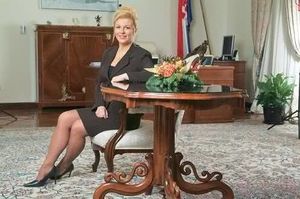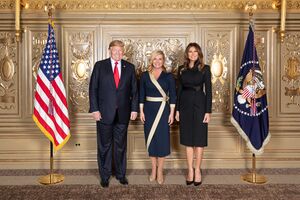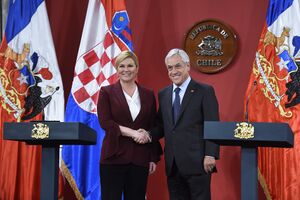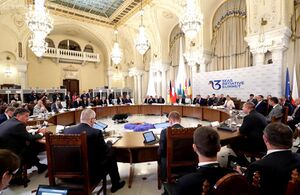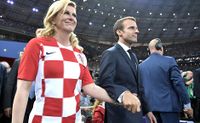كولندا غرابار-كيتاروڤتش
| كولندا گرابار-كيتاروڤتش Kolinda Grabar-Kitarović | |
|---|---|
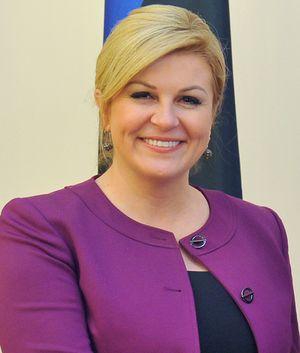
| |
| رئيس كرواتيا الرابع[a] | |
| في المنصب 19 فبراير 2015 – 15 فبراير 2020 | |
| رئيس الوزراء | زوران ميلانوڤتش Tihomir Orešković أندريه پلنكوڤتش (المعين) |
| سبقه | إيڤو يوسيپوڤتش |
| خلفه | زوران ميلانوڤيتش |
| مساعد الأمين العام للـناتو للدبلوماسية العامة | |
| في المنصب 4 يوليو 2011 – 2 أكتوبر 2014 | |
| سبقه | ستفاني بابست (بالنيابة) |
| خلفه | تد وايتسايد (بالنيابة) |
| السفير الكرواتي إلى الولايات المتحدة | |
| في المنصب 8 مارس 2008 – 4 يوليو 2011 | |
| سبقه | نڤن يوريتسا |
| خلفه | ڤيتسى سكراتشتش (بالنيابة) |
| وزير الخارجية والشئون الأوروپية | |
| في المنصب 17 فبراير 2005 – 12 يناير 2008 | |
| رئيس الوزراء | إيڤو سنادر |
| سبقه | ميومير جوجول (للشئون الخارجية) نفسها (للشئون الأوروپية) |
| خلفه | Gordan Jandroković |
| وزير الشئون الأوروپية | |
| في المنصب 23 ديسمبر 2003 – 16 فبراير 2005 | |
| رئيس الوزراء | إيڤو سنادر |
| سبقه | نڤن ميميتسا |
| خلفه | المنصب ألغي |
| تفاصيل شخصية | |
| وُلِد | Kolinda Grabar 29 أبريل 1968 رييكا، كرواتيا ج.ا.، يوغسلاڤيا ج.ا.ا. (الآن كرواتيا) |
| الحزب | الاتحاد الديمقراطي الكرواتي (1993–2015) مستقلة (2015–الحاضر)[1] |
| الزوج |
Jakov Kitarović (m. 1996) |
| الأنجال | Katarina Luka |
| الجامعة الأم | جامعة زغرب الأكاديمية الدبلوماسية في ڤيينا |
| الدين | كاثوليكية[2] |
| التوقيع | 
|
| الموقع الإلكتروني | Government website |
| ^a الرابع منذ الانتخابات البرلمانية الكرواتية 1990. والرئيس الكرواتي العشرون إجمالاً. | |
كولندا گرابار-كيتاروڤتش (Kolinda Grabar-Kitarović ؛ تـُنطق [kȏlǐndǎ gr̩abâr̩ kitǎːr̩oʋit͡ɕ]؛ وُلِدت في 29 أبريل 1968) هي سياسية كرواتية تعمل رئيس كرواتيا الرابع منذ 19 فبراير 2015. وهي أول إمرأة تُنتخب رئيساً لكرواتيا منذ أول انتخابات متعددة الأحزاب في 1990، وكذلك الأصغر عمراً، بعمر 46.[3][4][5]
قبل انتخابها رئيساً، عملت گرابار-كيتاروڤتش كأول إمرأة في منصب وزير الشئون الأوروپية من 2003 وحتى 2005 و وزير الخارجية والتكامل الأوروپي من 2005 إلى 2008 في كل من وزارة إيڤو سنادر الأولى و الثانية، وكذلك كسفير كرواتيا إلى الولايات المتحدة من 2008 إلى 2011 ومساعد الأمين العام للـناتو للدبلوماسية العامة تحت الأمينين العامين أندرس فوگ راسموسن و ينز ستولتنبرگ في الفترة 2011-2014.[6]
وكانت گرابار-كيتاروڤتش عضوة في حزب الاتحاد الديمقراطي الكرواتي المحافظ من 1993 وحتى 2015[7] وأحد ثلاثة أعضاء كروات في المفوضية الثلاثية،[8] ولكن كان عليها الاستقالة من المنصبين في 2015 إذ لا يُسمح للرؤساء الكروات الاحتفاظ بمناصب سياسية أو حزبية أثناء شغلهم منصب الرئاسة.[9]
النشأة والتعليم
وُلِدت كولندا گرابار في 29 أبريل 1968 في رييكا ابنة لكل من دوبراڤكا وبرانكو گرابار.[10] ونشأت في قرية أبويها لوپاتشا، إلى الشمال مباشرة من رييكا، حيث كانت عائلتها تملك محل جزارة ومرعى.[10]
كطالبة في المرحلة الثانوية، التحقت ببرنامج التبادل الطلابي وفي عمر 17 انتقلت إلى لوس ألاموس، نيو مكسيكو، ولاحقاً تخرجت من مدرسة لوس ألاموس الثانوية في 1986.[10][11]
وبمجرد عودتها إلى يوغسلاڤيا، التحقت بكلية الآداب والعلوم الاجتماعية في جامعة زغرب، حيث تخرجت في 1992 ببكالوريوس آداب في اللغتين الإنگليزية والاسبانية وآدابهما.[6] ومن 1995 إلى 1996، التحقت بكورس دبلوما في الأكاديمية الدبلوماسية في ڤيينا.[12] وفي 2000 حصلت على درجة الماجستير في العلاقات الدولية من كلية العلوم السياسية في جامعة زغرب.[6]
وفي 2002–03 التحقت بـجامعة جورج واشنطن كباحثة فولبرايت.[13][14] كما حصلت على زمالة لوكسيتس في كلية كندي للحكم في جامعة هارڤرد وكانت دارس زائر في كلية الدراسات الدولية المتقدمة في جامعة جونز هوپكنز.[6]
وفي ديسمبر 2015، بدأت گرابار-كيتاروڤتش دراسة الدكتوراه في العلاقات الدولية في قسم العلوم السياسية في جامعة زغرب.[15]
العمل السياسي
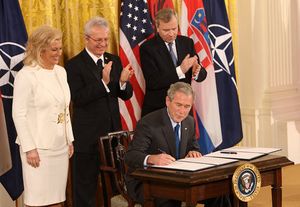
رئاستها (2015-2020)
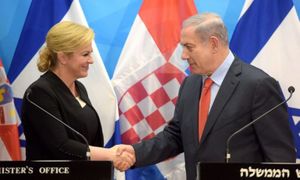 رئيسة كرواتيا كولندا گرابار-كيتاروڤتش تزور رئيس وزراء إسرائيل بنيامين نتنياهو في القدس في 23 يوليو 2015. |
Less than nine months into Grabar-Kitarović's term the European migrant crisis began to escalate with large numbers of migrants entering Greece and Macedonia and crossing from Serbia into Hungary, with the latter beginning the construction of a fence on its southern border as a result.[16] In September 2015, after Hungary constructed a fence and closed its border with Serbia, the flow of migrants was redirected towards Croatia, causing over 21,000 migrants to enter the country[17] by 19 September, with the number rising to 39,000 immigrants, while 32,000 migrants exited Croatia, leaving through Slovenia and Hungary.[18] She appointed Andrija Hebrang her commissioner for the refugee crisis.[19]
With the parliament expected to dissolve by 25 September,[20] Grabar-Kitarović called parliamentary elections for 8 November 2015.[21] They proved inconclusive and negotiations on forming a government lasted for 76 days. Grabar-Kitarović had previously announced on 22 December 2015 that if there was no agreement on a possible Prime Minister-designate in the next 24 hours, she would call for an early election and name a non-partisan transitional government (which would have reportedly been headed by Damir Vanđelić), thereby putting intense pressure on the political parties involved in the negotiations regarding the formation of the new government, to find a solution. The crisis finally ended on 23 December 2015 when Grabar-Kitarović gave the 30-day mandate to form a government to the non-partisan Croatian-Canadian businessman Tihomir Orešković, who had been selected by HDZ and MOST only hours before the expiration of the President's delegated time frame for the naming of a Prime-Minister-designate.

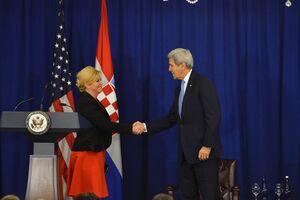
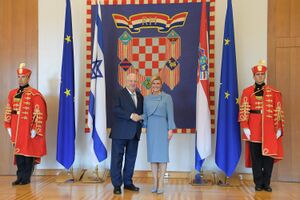
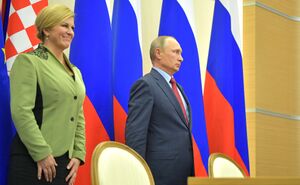
On 24 August 2015, Grabar-Kitarović was, as Armed Forces Commander-in-Chief, presented with a petition for the introduction of a salute Za dom spremni to the official use in the Croatian Armed Forces. She immediately rejected the petition, calling it "frivolous, unacceptable and provocative".[22] She called the salute a "Croatian historical greeting" that was "compromised and unacceptable". Following a backlash from some historians that the salute was not historical, Grabar-Kitarović admitted that she was wrong in that part of the statement.[23]
On 29 September 2015, at the initiative of Grabar-Kitarović the Atlantic Council co-hosted an informal high-level Adriatic-Baltic-Black Sea Leaders' Meeting in New York City[24] which would later grow to Three Seas Initiative. The Initiative was officially formed in 2016 and held its first summit in Dubrovnik, Croatia, on 25–26 August 2016.[25]
On 11 April 2016, after meeting with Nicolas Dean, the special envoy for Holocaust of the United States Department of State, Grabar-Kitarović stated that the "Independent State of Croatia (NDH) was least independent and was least protecting the interests of the Croatian people". Adding that the "Ustaše regime was criminal regime", that "anti-fascism is in the foundation of the Croatian Constitution" and that the "modern Croatian state has grown on the foundations of the Croatian War of Independence."[26] In May 2016, Grabar-Kitarović visited Tehran on the invitation of Iranian President Hassan Rouhani. Rouhani called on Croatia to be the gateway to Iran's ties with Europe.[27][28] The two presidents reaffirmed the traditionally good relations between their countries and signed an agreement on economic cooperation.[29]
Grabar-Kitarović expressed her condolences to Slobodan Praljak's family after he committed suicide in The Hague where he was facing trial, calling him "a man who preferred to give his life, rather than to live, having been convicted of crimes he firmly believed he had not committed",[30] adding that "his act struck deeply at the heart of the Croatian people and left the International Criminal Tribunal for the Former Yugoslavia with the weight of eternal doubt about the accomplishment of its tasks".[31]
In a speech held at the ceremony at which Grabar-Kitarović was named honorary citizen of Buenos Aires in March 2018,[32] she stated that "after World War II, many Croats found a space of freedom in Argentina where they could testify to their patriotism and express their justified demands for the freedom of the Croatian people and homeland."[33] Following the end of the war and the establishment of a communist regime, about 20,000 Croats, mostly political emigrants, moved to Argentina. As some among them were members of the Ustaše movement,[34] her statement was interpreted by some, including Efraim Zuroff of the Simon Wiesenthal Center, as support for them.[35][36] In a press release, Grabar-Kitarović rejected what she described as "malicious interpretations" of her statement.[34]
During the 2018 FIFA World Cup, held in Russia, Grabar-Kitarović attended the quarter-final and final matches, wearing the colors of the national flag in support of the national team, which ultimately ended up as tournament runners-up.[بحاجة لمصدر] According to the analytics company Mediatoolkit, she "emerged as her country’s star of the tournament" with "25% more focus on her in news stories about the final than any of the players on the pitch", as she "travelled to Russia at her own expense in economy class and often watched from the non-VIP stands".[37] Commenting on the appearance of Croatian singer Marko Perković at the celebration, Grabar-Kitarović stated that she “never heard” such songs nor “seen any evidence that they exist”, was "very fond" of some of his songs and that she did not see any evidence for the controversies associated to him, claiming his songs are "good for national unity". She condemned all totalitarian regimes, including nazism, fascism, and communism.[36][38]
Grabar-Kitarović was awarded Fulbright Association's 2019 Lifetime Achievement Award for her "remarkable, contributions as a leader, diplomat, and public servant".[39]
سياستها الاقتصادية
انضمت كرواتيا إلى البنك الدولي عام 1993، بعد عامين من إعلان استقلالها عن جمهورية يوغوسلاڤيا الاتحادية الاشتراكية عام 1991. كانت مشروعات البنك الدولي المبكرة في منتصف التسعينيات حتى منتصف عقد 2000 تتركز بصفة رئيسية على البنية التحتية والمشروعات البيئية، موضوع مشروع فريد من نوعه بالنسبة لكرواتيا لأن المناظر الطبيعية في كرواتيا تقود صناعة السياحة القوية المضمنة نفقاتها في التصدير.
مع بداية ظهور الركود العالمي وأزمة منطقة اليورو في 2008، تحولت قروض البنك الدولي في كرواتيا من البنية التحتية إلى اعادة الهيكلة المالية المؤسسية. دخول كرواتيا الاتحاد الأوروپي عام 2013[40]، ترافق مع الركود المطول الذي دام ما يقرب من 2009-2015، أدى إلى تحول قروض البنك الدولي نحو التركيز الأساسي على مشروعات الإقراض لمساعدة الحكومة الكرواتية على التعامل مع عملية التقارب بين الاتحاد الأوروپي والبنك الوطني الكرواتي مع السياسة النقدية مع السياسة النقدية التي من شأنها إخراج كرواتيا من الركود. بعد ظهور الركود العالمي (الذي أثر على الاقتصاد الكرواتي من 2008-2016) انخفض الإقراض من البنك الدولي للإنشاء والتعمير ومؤسسة التمويل الدولية بشكل حاد إلى 22 مليون دولار في عام 2016، مقارنة بـ279 مليون دولار في العام السابق. ومع ذلك، ارتفعت التزامات البنك الدولي إلى مستوى جديد لتصل إلى 394 مليون دولار في عام 2017.[41][42]
سياستها الخارجية
البوسنة

في فضيحة هي الأكبر منذ نهاية حرب البوسنة 1992-95، نشرت صحيفة زورنال الصادرة من سراييڤو، في 15 مارس 2019، أن عملاء المخابرات الكرواتية، بمساعدة الدبلوماسيين الكروات في البوسنة، حاولوا تشويه سمعة البوسنة بتصويرها "أرض للإرهاب الإسلامي المتطرف".[43]
بذلك، تكون كرواتيا قد تورطت في عمل خطير من أعمال الحرب الهجينة، وهي معلومات أكدها وزير الأمن البوسني دراگان مكتيتش. لا تزال تفاصيل الفضيحة غير واضحة، لكن في حالة ثبوتها ستأخذ نفس الزخم الذي أخذته فضيحة إيران كونترا.
نشرت صحيفة زورنال تفاصيل مأخوذة من وثائق الأجهزة الأمنية البوسنية، ومن محادثات مع أحد أعضاء الحركة السلفية الإسلامية المحافظة، والتي تكشف عن خطة فاشلة لزرع أسلحة والمتفجرات في المساجد البوسنية. وحسب أجهزة الأمن البوسني، سيتم الكشف عن موقع الأسلحة بواسطة الأشخاص الذين قاموا بزرعها.
كما تواردت أنباء عن ابتزاز المخابرات الكرواتية للسلفيين البشناق، على المعابر، وتهدديهم بإلغاء تصاريح عملهم، إذا لم يحملوا عبوات أسلحة إلى مساجد في أرجاء البوسنة. أبلغ العديد منهم الصحف والسلطات في البوسنة.
وهذا من شأنه أن يبرر التصريحات السابقة لكبار المسؤولين الكروات مثل الرئيسة الكرواتية كولندا گرابار-كيتاروڤتش بأن البوسنة "مرتع للإرهاب" وتضم ما لا يقل عن "10.000 متطرف".
مروراً بنظريات المؤامرة التي نشأت في 2016، وروجت لها وسائل الإعلام الكرواتية، أو منذ بداية الهجوم المضلل الذي ربط بين البوشناق (مسلمي البوسنة) والإرهاب، والرواية المزيفة حول المعسكرات الإرهابية في البوسنة، وصولاً إلى المؤامرة الكرواتية الأخيرة لزرع الأسلحة في المساجد البوسنية، إلى مؤامرة مخططة بعناية لنزع الشرعية عن البوسنة.
وتعتبر هذه رابع فضيحة، في غضون عام، للتدخل السافر لكرواتيا في شئون البوسنة، الأولى حين شارك السفير الكرواتي في البوسنة في حفل تأبين لمجرم حرب صربي مدان دولياً، مما اضطر السفين إلى ترك منصبه. والثانية تشير لتدخل رئيس الوزراء الكرواتي أندريه پلنكوڤتش بنفسه في الانتخابات البوسنية 2018، والثالثة بيع القنصلية الكرواتية في توزلا لـ10.000 جواز سفر مزور للمافيا الصربية.
انظر أيضاً
معرض الصور
گرابار-كيتاروڤتش تشجع المنتخب الكرواتي في نهائيات كأس العالم 2018.
گرابار-كيتاروڤتش برفقة الرئيس الأمريكي دونالد ترمپ، يوليو 2017.
الهوامش
المصادر
- ^ "BIOGRAFIJA KOLINDE GRABAR KITAROVIĆ, PRVE HRVATSKE PREDSJEDNICE Put marljive odlikašice iz Rijeke do Pantovčaka". Jutarnji.hr. 2015-01-12. Retrieved 2015-09-06.
- ^ "Grabar-Kitarovic: Croatia's first female president". Yahoo! News. 11 January 2015. Retrieved 26 February 2015.
- ^ "Grabar-Kitarovic elected Croatia's first woman president". BBC. 12 January 2015. Retrieved 28 October 2015.
- ^ "Kolinda Grabar-Kitarovic elected president of Croatia". CBC. 11 January 2015. Retrieved 28 October 2015.
- ^ Autor: Hina (2015-02-15). "NOVA PREDSJEDNICA Evo što svjetske agencije javljaju o Kolindinoj inauguraciji". Jutarnji.hr. Retrieved 2016-05-01.
- ^ أ ب ت ث NATO (29 August 2014). "NATO – Biography: Kolinda Grabar-Kitarovic, Assistant Secretary General for Public Diplomacy". NATO.
- ^ "Kolinda se javila šefu Karamarku: Izlazim iz HDZ-a". Jutarnji.hr. Retrieved 6 March 2015.
- ^ "Kolinda Grabar Kitarović - nova nada Hrvatske". Narodni List. Retrieved 6 March 2015.
- ^ "Kolinda više nije članica Rockefellerove Trilaterale, jedne od najmoćnijih grupa na svijetu - Vijesti". Index.hr. Retrieved 2015-09-06.
- ^ أ ب ت "BIOGRAFIJA PRVE ŽENE NA ČELU DRŽAVE". Jutarnji.hr. Retrieved 14 January 2014.
- ^ "Grabar-Kitarovic to Speak Feb. 14 – News Releases". Library of Congress.
- ^ [1] Archive copy at the Internet Archive
- ^ "Officials". AllGov.com. Retrieved 29 December 2014.
- ^ "GW News Center". gwu.edu.
- ^ http://www.vecernji.hr/hrvatska/kolinda-grabar-kitarovic-se-i-sluzbeno-upisala-na-doktorski-studij-1042202#
- ^ Associated Press in Budapest (13 July 2015). "Hungary begins work on border fence to keep out migrants | World news". The Guardian. Retrieved 2016-05-01.
- ^ "HRT: U Hrvatsku ušlo oko 21.000 izbjeglica - Mađari ih prihvaćaju bez registracije" (in الكرواتية). Hrt.hr. 2016-01-05. Archived from the original on 7 April 2019. Retrieved 2016-05-01.
- ^ Hina (2015-09-22). "STIGLE NOVE BROJKE U Hrvatsku dosad stiglo 36.000 izbjeglica: 'Bapska nas je iznenadila, ali sada je situacija bolja, dolaze u grupama od 70-ak ljudi'". Jutarnji.hr. Archived from the original on 5 March 2016. Retrieved 2016-05-01.
- ^ Piše: R.I.A. (2015-09-19). "Kolindin povjerenik Hebrang: Vojska je trebala na granici tijelima zapriječiti ulazak izbjeglica - Vijesti". Index.hr. Retrieved 2016-05-01.
- ^ "Josip Leko najavio raspuštanje Sabora 25. rujna - Večernji.hr". Vecernji.hr. Retrieved 2016-05-01.
- ^ "Večernji doznaje: Parlamentarni izbori održat će se najkasnije 15. studenoga - Večernji.hr". Vecernji.hr. 2015-01-09. Retrieved 2016-05-01.
- ^ "BIZARNU PETICIJU POTPISAO I ŠIMUNIĆ Od predsjednice traže da predloži uvođenje pozdrava 'Za dom spremni' u Oružane snage!". Jutarnji.hr. 2015-08-24. Archived from the original on 3 February 2016. Retrieved 2016-02-28.
- ^ "Grabar-Kitarovic: Serbian President's visit to Croatia was not a mistake". N1. 16 February 2019. Archived from the original on 4 January 2020. Retrieved 28 October 2019.
- ^ "Adriatic-Baltic-Black Sea Leaders Meeting". atlanticcouncil.org. 2015-10-29. Retrieved 2017-07-06.
- ^ "Dubrovnik Forum adopts declaration called "The Three Seas Initiative"". eblnews.com. 2016-08-25. Archived from the original on 16 January 2017. Retrieved 2017-07-06.
- ^ Dragan Matić/ CROPIX (2016-04-11). "KOLINDA GRABAR KITAROVIĆ 'NDH je bila najmanje nezavisna i najmanje je štitila interese Hrvata, a ustaški režim bio je zločinački!' -Jutarnji List". Jutarnji.hr. Retrieved 2017-01-23.
- ^ "Rouhani: Croatia can be gateway to Iran's ties with Europe". Tehran Times. 2016-05-18. Retrieved 2016-06-11.
- ^ "Rouhani officially welcomes Croatian president". Tehran Times. 2016-05-18. Retrieved 2016-06-11.
- ^ "Potvrđeni tradicionalno dobri i prijateljski odnosi Hrvatske i Irana - Večernji.hr". Vecernji.hr. 2016-05-18. Retrieved 2016-06-11.
- ^ "Slobodan Praljak: War criminal or Croatian hero?" on Al-Jazeera, 30 November 2017.
- ^ "Predsjednica: Hrvatski narod prvi se odupro velikosrpskoj agresiji braneći svoju opstojnost i opstojnost BiH" [President: The Croatian people first resisted the Greater Serbia aggression by defending its survival and the survival of BiH] (in الكرواتية). Croatian Radiotelevision. 30 November 2017. Retrieved 30 November 2017.
- ^ "President Begins Visit to Argentina, Meets with Diaspora". total-croatia-news.com. HINA. 12 March 2018.
- ^ "Kolinda: Mnogi su Hrvati u Argentini pronašli slobodu nakon Drugog svjetskog rata". index.hr. Hina. 13 March 2018.
- ^ أ ب "President Rejects "Malicious Interpretations" of Her Speech in Argentina". total-croatia-news.com. Hina. 15 March 2018.
- ^ "Bauk o Kolindinim izjavama u Argentini: Da je to izjavila Merkel strpali bi je u zatvor". index.hr. 14 March 2018.
- ^ أ ب Gadzo, Mersiha (18 August 2018). "How Croatia's World Cup party highlighted 'fascist nostalgia'". Al Jazeera.
- ^ Zagreb, Una Hajdari in (2018-07-16). "Croatia's real World Cup star? The president in the stands". the Guardian (in الإنجليزية). Retrieved 2018-07-16.
- ^ "Grabar-Kitarovic: Everyone is slowly giving up on Bosnia". N1. 27 July 2018. Archived from the original on 4 January 2020. Retrieved 22 September 2019.
- ^ "2019 Lifetime Achievement Award: Kolinda Grabar-Kitarović". Fulbright.org. 29 August 2019. Retrieved 5 January 2020.
- ^ "Croatia celebrates on joining EU" (in الإنجليزية البريطانية). 2013-07-01. Retrieved 2019-04-09.
- ^ "Projects & Programs". World Bank (in الإنجليزية). Retrieved 2018-12-05.
{{cite web}}: Cite has empty unknown parameter:|dead-url=(help) - ^ "Croatia | Data". data.worldbank.org. Retrieved 2018-12-12.
- ^ "Croatia Looks Implicated in Serious Hybrid Warfare Against Bosnia". بلقان إنسايت. 2019-03-15. Retrieved 2019-03-18.
وصلات خارجية
| مناصب سياسية | ||
|---|---|---|
| سبقه نڤن يوريتسا |
وزير التكامل الأوروپي 2003–2005 |
المنصب ألغي |
| سبقه ميومير جوجول بصفته وزير الشئون الخارجية |
وزير الخارجية والتكامل الأوروپي 2005–2008 |
تبعه گوردان ياندروكوڤتش |
| سبقه نفسها بصفته وزير التكامل الأوروپي | ||
| سبقه إيڤو يوسيپوڤتش |
رئيس كرواتيا 2015–الحاضر |
الحالي |
| مناصب دبلوماسية | ||
| سبقه نڤن يوريتسا |
السفير إلى الولايات المتحدة 2008–2011 |
تبعه ڤيتسى سكراتشتش بالنيابة |
| سبقه Stefanie Babst بالنيابة |
مساعد الأمين العام للـناتو للدبلوماسية العامة 2011–2014 |
تبعه تد وايتسايد بالنيابة |
- CS1 الكرواتية-language sources (hr)
- CS1 الإنجليزية البريطانية-language sources (en-gb)
- Short description is different from Wikidata
- مواليد 29 أبريل
- مواليد 1968
- شهر الميلاد مختلف في ويكي بيانات
- يوم الميلاد مختلف في ويكي بيانات
- Articles with unsourced statements from December 2020
- سفراء كرواتيا إلى الولايات المتحدة
- مرشحو الرئاسة الكرواتية
- سياسيو الاتحاد الديمقراطي الكرواتي
- دبلوماسيون كروات
- مغتربون كروات في بلجيكا
- مغتربون كروات في كندا
- خريجو جامعة زغرب
- طاقم تدريس جامعة زغرب
- وزيرات خارجية
- رئيسات دول
- وزراء خارجية كرواتيا
- أشخاص أحياء
- أشخاص من رييكا
- رؤساء كرواتيا
- وزيرات كرواتيات

